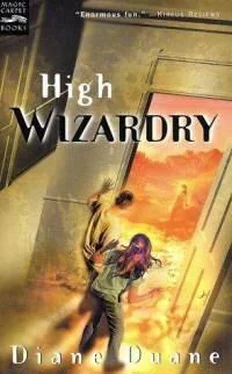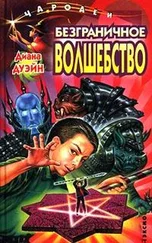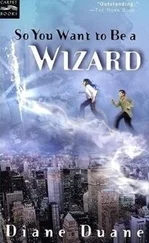Диана Дуэйн - High Wizardry
Здесь есть возможность читать онлайн «Диана Дуэйн - High Wizardry» весь текст электронной книги совершенно бесплатно (целиком полную версию без сокращений). В некоторых случаях можно слушать аудио, скачать через торрент в формате fb2 и присутствует краткое содержание. Жанр: Фэнтези, Детская фантастика, на английском языке. Описание произведения, (предисловие) а так же отзывы посетителей доступны на портале библиотеки ЛибКат.
- Название:High Wizardry
- Автор:
- Жанр:
- Год:неизвестен
- ISBN:нет данных
- Рейтинг книги:5 / 5. Голосов: 1
-
Избранное:Добавить в избранное
- Отзывы:
-
Ваша оценка:
- 100
- 1
- 2
- 3
- 4
- 5
High Wizardry: краткое содержание, описание и аннотация
Предлагаем к чтению аннотацию, описание, краткое содержание или предисловие (зависит от того, что написал сам автор книги «High Wizardry»). Если вы не нашли необходимую информацию о книге — напишите в комментариях, мы постараемся отыскать её.
High Wizardry — читать онлайн бесплатно полную книгу (весь текст) целиком
Ниже представлен текст книги, разбитый по страницам. Система сохранения места последней прочитанной страницы, позволяет с удобством читать онлайн бесплатно книгу «High Wizardry», без необходимости каждый раз заново искать на чём Вы остановились. Поставьте закладку, и сможете в любой момент перейти на страницу, на которой закончили чтение.
Интервал:
Закладка:
Pain. There was enough of it. Frustration, rage at the world that wouldn't do what she wanted, fear at all kinds of things that she didn't understand: fear of things she heard on the news at night, a world full of bombs that can kill everything, full of people hungry, people shooting at each other and hating each other; hearing her parents shouting downstairs while she huddled under the covers, feeling like the world was going to end-will they shoot each other now? Will they have a divorce? Finding out that her best friend is telling other kids stories about how she's weird, and laughing at her behind her back; finding that she's alone in the world; making new friends, but by force, by cleverness and doing things to make her popular, not because friends come to her naturally; making herself slightly feared, so that people! will leave her alone to do the things she wants to without being hassled! beating her fists against the walls of life, knowing that there's more, more| but she can't figure out what it is, then finding out that someone knows the secret. Wizardry. And it doesn't come fast enough, it never comes fas enough, nothing ever does. . and now the price is going to be paid forj that, because she doesn't know enough to save these lovely glassy creature her buddies, that she watched be born. . helped be born. . her chil-j dren, sort of… she doesn't know how to save them, and they're going to be dead, everything's going to be dead: pain!
It hurts too much, Dairine thought, lying there listening to her heartbeat! slowly begin to die away, it hurts, I didn't want them to get hurt! But it was! part of the data, and it was too late now: the motherboard had it, and all thel mobiles would have it too, the second she released Dairine. Why should theyl care about slowlife now? she thought in anguish and shame at the bitter! outrush of what her life had been. Cruelty, pettiness, selfishness almost in-1 credible- But too late now. The motherboard was saving the last and newest I of the data to permanent memory. Any minute now the mobiles would start I the program running and entropy would freeze, and life would stop being a word that had a meaning.
The last nanosecond crawled by, echoes of the save rolled in the link. Nothing ever comes fast enough: end of file. .
Dairine lay still and waited for it all to end.
And lightning struck her. The flow of data reversed. She would have screamed, but trapped in the quicklife time of the motherboard, everything happened before the molasses-slow sparks of bioelectricity even had time to jump the motor synapses on the beginning of their journey down her nerves. The motherboard was pouring data into her as it had poured it into the mobiles under Dairine's tutelage: but not the mercifully condensed version of the manual programming that it had given them. The whole manual, the entire contents of the software, which in book form can be as small as a paperback or larger than a shelf full of telephone books: it poured into her, and she couldn't resist, only look on in a kind of fascinated horror as it filled her, and filled her, and never overflowed, just filled and filled. . The dinosaurs could have died while it filled her, life could have arisen on a hundred worlds and died of boredom in the time it took to fill her. She forgot who and what she was, forgot everything but this filling, filling, and the pain it cost her, like swallowing a star and being burnt away by it from the inside while eternally growing new layers on the outside: and finally not even the pain made sense anymore. .
She lay there on her side and stared at the ground, and was astonished not to see the crumbs from her sandwich in front of her nose. She could not move, or speak, and she could just barely think, with great pain and effort. There was something wrong with the way time was flowing, except that every time she tried to think what it was exactly, the timeflow seemed perfectly all right. Shapes were moving in front of her, and voices were speaking, either in vast soft drawls or light singing voices that seemed familiar.
Slowly names attached themselves to the voices.
"Now we see what these 'heart' things she gave us are for." That was Gigo. Good kid, she thought weakly, good baby. You tell 'em.
"And what entropy does, and what it cannot touch, ever." That was Beanpole, the silly-looking thing: where did he get such a voice? "Not all the evils and deaths it makes possible can touch the joys that run through it. We will have those too."
"We will not stop that joy," said Monitor. "Not for a nanosecond."
"It may be slow," said one of the mobiles, one whose name Dairine couldn't remember. "But it is life.
And it brought us life. We do nothing to harm that."
"And if you are against that," said Gigo, "your programming is in error, and we are against you."
They all sounded more complete than they had. The one voice she did not hear was Logo's. But she did hear something stranger: a murmur of astonishment that went up from the thousands of mobiles. And was there a trace of fear in it? She couldn't move, couldn't see what was happening. .
"Your choice," said another voice. At the sound of it, Dairine struggled with all her might to move, and managed to do no more than lever herself up half an inch or so and then flop down flat again, limp as a filleted fish. "Enjoy it. You will make no more choices. . but first, to pay for the one you have made, you will watch what the entropy you love so much will do to her."
Dairine lay still, waiting for the lightning to strike.
And another voice spoke.
"Wanna bet?" it said.
It didn't feel us arrive right when we did, Nita thought. How distracted It is! What's she been doing to It?
She and Kit actually had a second to collect themselves when they appeared, and Nita looked around her in a hurry. Another barren world, a great flaming barred-spiral galaxy flung across its night, an old tired star high in the sky, type N or S from the look of it, and a crowd of robots, crowded around Dairine and looking at her-and them- and the Lone One.
As with any other of the Powers, though there will be general similarities of vision among the like-minded, no two people ever see the Lone One in exactly the same way. Nita saw the good-looking young red-haired man she had seen in a skyscraper in the alternate otherworld the Lone One called his own. He was not wearing the three-piece suit he had affected there. Now he was dark-clad and dark-cloaked, unarmed and needing no armor: a feeling of cold and power flowed from him and ran impossibly along the ground, as if carried on a chill air. As the sight sank in, Nita shook like a leaf. What Kit might see, what Dairine and the robots might be seeing, Nita wondered briefly, then put the thought aside. She had other business.
It turned and looked at them. Nita stood as straight as she could under the circumstances, her manual in one hand, the other hand clutched on the gimbal in her pocket; beside her Kit stood almost the same way, except that Picchu sat on his wrist, making him look like a king's falconer. "Fairest and fallen," Nita said, "greeting and defiance." It was the oldest courtesy of wizards, and the most dangerous, that line: one might be intending to cripple or destroy that Power, but there was no need to be rude about it.
"You two," said the Lone One. "And a pet for company. Adorable. . and well met. You are off your own ground and well away from help at last. It took me long enough to set up this trap, but it was worth it."
Kit glanced at Nita and opened his mouth, but Picchu beat him to it. "And that's all you're going to get out of it," Peach said, "since the real prize you hoped to catch in that trap has obviously slipped out of it."
Peach began to laugh. "You never learn, do you? You're not the only one who can structure the future. The other Powers will sometimes scruple to do it. Not often. . but They took a special interest in this case. The first time you've completely lost a Choice, from the beginning."
Читать дальшеИнтервал:
Закладка:
Похожие книги на «High Wizardry»
Представляем Вашему вниманию похожие книги на «High Wizardry» списком для выбора. Мы отобрали схожую по названию и смыслу литературу в надежде предоставить читателям больше вариантов отыскать новые, интересные, ещё непрочитанные произведения.
Обсуждение, отзывы о книге «High Wizardry» и просто собственные мнения читателей. Оставьте ваши комментарии, напишите, что Вы думаете о произведении, его смысле или главных героях. Укажите что конкретно понравилось, а что нет, и почему Вы так считаете.




